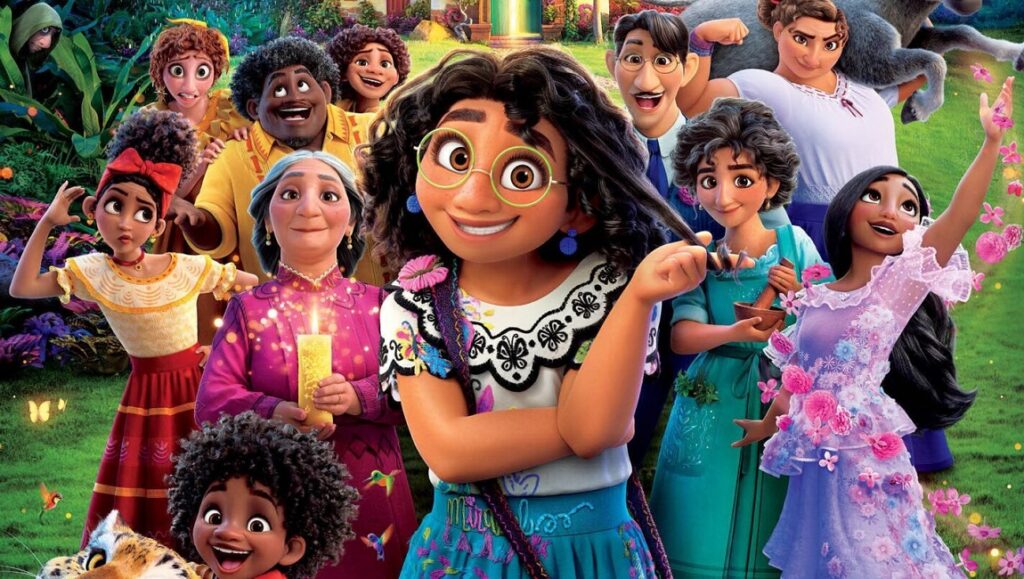Encanto can be a bit boring, a bit shallow, and a bit underwhelming in the musical department, but its gorgeous animation and rather quaint character make for a diverting enough trifle.
There has been a distressing amount of discourse as of late charging that Disney’s latest animated musical, Encanto, is nothing more than a carbon copy of Pixar’s 2016 offering Coco, as if the mere presentation of cartoon characters with darker complexions amounts to retread. That’s a real yikes of a conclusion. Sure, both films are thematically similar in that they deal with familial bonds and the importance of legacy — how many animated films these days aren’t about family? — but where Coco was borderline obsessed with death — by design, mind you — Encanto is far more concerned with the living, and specifically with how measuring up to standards inflicted by both family and society can lead to disappointment and resentment. The Madrigal clan depicted here may be Colombian, but the roles assigned to each family member prove universal, even given the film’s magical leanings. Some explanation: fifty years prior, matriarch Alma (María Cecilia Botero) escaped with her three children from marauders who attacked her small village, but her husband, Pedro, perished in the fighting, and his death — paired with Alma’s anguish — caused the universe to grant her a magical candle whose flame can never be extinguished. In the mountains of Colombia sprung forth an Encanto, a charmed place that blessed the family with a sentient house and each member a special magical power, or “gift,” which is revealed upon one’s tenth birthday. Unfortunately, third-generation Mirabel (Stephanie Beatriz) is gifted with no special ability, leaving her a bit of an outcast and an easy scapegoat for abuela Alma when, years later, the family’s magic appears to be dissipating. Wanting to finally prove her worth to her loved ones, Mirabel goes on a quest to figure out why the family’s bond is weakening, uncovering long-standing resentments and opening old wounds in the process.
Heady enough stuff for a supposed kid’s film, and while Encanto refuses to pull its punches in this regard, it’s that commitment to authentic familial strain that can make the proceedings feel like a bit of a slog, even as that authenticity never builds as much depth as it should. Directors Byron Howard and Jared Bush, along with screenwriter (and playwright) Charise Castro Smith, have some fun with the magical powers granted to the various Madrigals, specifically in how such powers adhere to established familial roles. Mom (Angie Cepeda) has been granted the ability to heal through the food she cooks; oldest sister Luisa (Jessica Darrow) is super-strong, forced to carry the weight of the world quite literally on her shoulders; middle sister Isabela (Diane Guerrero) is gorgeous and perfect and has the power to bring beauty wherever she travels by manifesting floral spectacle. Meanwhile, there’s also an aunt who is extremely temperamental and whose severe emotions can alter the weather, while several cousins include a prankster who can shapeshift into anyone and anything, and another who is gossipy and has the power of super-hearing. But it’s in Mirabel that the film fixes its emotional core, presenting a woman who has yet to discover the thing that truly makes her “special,” a wallflower with low self-esteem who only knows how to regard herself within the shadow of her family, and feels inferior in the process. In other words, Mirabel feels far more like the classic middle child than the youngest. Also on the roster is Uncle Bruno, the family’s black sheep who abandoned them when they could no longer tolerate his eccentricities, which extended to his gift of prophecy; a musical number entitled “We Don’t Talk About Bruno” fills in the gaps.
The film does plenty of table-setting in this setup, and Encanto proceeds to excel in exposing these stereotypes for their fallacies, taking aim at the prescribed roles imposed upon people that so often destroy individuality, self-worth, and even familial bonds. It’s unfortunate, then, that the film simply trades in one set of stereotypes for another, as the Madrigals are finally exposed to a “greater truth.” Each family member accepts their true self in the most banal ways possible, and the film seems to be bored stiff with the clichéd morals it hoists upon audience members, rushing through myriad character arcs in a three-minute song that limits their new self-identification to a few lyrics. And speaking of the music, Lin-Manuel Miranda is (predictably) on board to deliver yet another soundtrack filled with bouncy songs whose lyrics become utterly brain-dead in their obvious attempts at cleverness. Strangely, though, none of the songs here prove much memorable, and there aren’t even any big numbers a la Moana‘s “You’re Welcome” that will keep kids humming for the next couple months. As unsurprising as meme Miranda’s presence is that the animation is indeed gorgeous, so rich in detail that even the thread that stitches together Mirabel’s unflattering dress feels distinctly palpable. Directors Howard and Bush, for their part, have certainly delivered a cartoon flick of bubblegum beauty, and they also keep things moving at a brisk pace, even with a surprising dearth of big action or comedic set pieces, and in that way, Encanto comes to feel rather quaint, a welcome respite from the litany of bombastic animated films that all seem to follow the same tiresome schematic. Wee ones may find this Disney offering a little more boring than whatever Blu-Ray is on repeat at home, and adults may check out for its lack of substance relative to the Mouse House and Pixar greats. But ultimately, it’s hard to entirely resist the film’s many charms and clear relatability. In a holiday season predisposed to generosity, Encanto arrives at an opportune time, a pleasant little gift that might even bring together a dysfunctional clan or two.


Comments are closed.